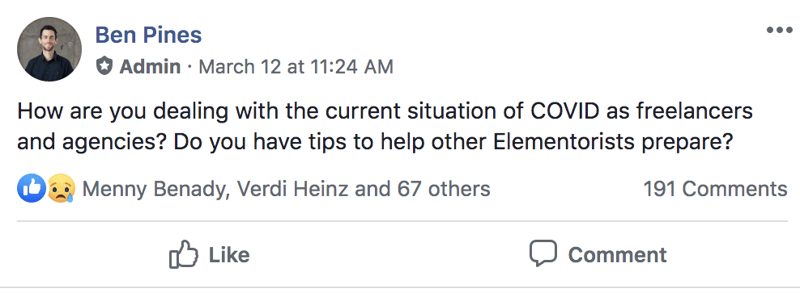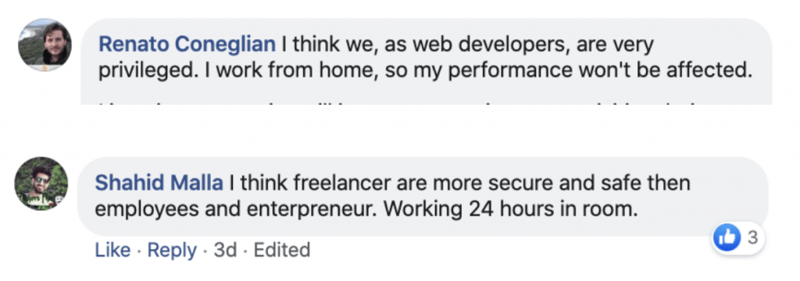Table of Contents
The coronavirus pandemic poses a threat for web creators, not only from a health perspective, but from an economic one, too. More and more people are confined to working from home, while the world’s economy is undergoing challenging times.
At Elementor, we are deeply concerned about the impact the virus will have on web creators around the world. For us, empowering web creators is not just a marketing slogan, it’s our everyday priority. This is why we want to draw a map of the current threats, and the ways professional web creators can prepare for these threats to make their business more prepared for the changes.
After I posed the question to the Elementor community, I received a wide range of opinions and responses, from Elementorists from all around the globe.

These responses helped me to write many of the ideas shared in this article, all geared towards helping freelance web creators and agencies prepare for the troubling times ahead.
Long Term Vs Short Term
The short term effects of COVID on different industries are obvious. Suspended flights, cancelled conferences and a deep dip in the stock market are just a few indicators of the global economic challenges brought on by the virus.
But the long term effects are no less concerning. Early signs point to the potential financial threats COVID poses on SMBs (Small and Medium-sized Businesses). Italian wine and cheese makers have started to experience a decline in demand.
According to a new survey from Veem, 27% of businesses expect the coronavirus to have a moderate-to-high impact on their revenue. Another 30% expect the virus to have a moderate-to-high impact on their supply chain. 52% say they are taking measures to prepare for an economic slowdown.
Is Being A Web Creator An Advantage Or Disadvantage?
Since many web creators are used to working from home, it might seem that they are most equipped to deal with the new remote situation. While employees of Google and other tech companies are advised to start working from home, freelance web creators already have their work stations, routines and tools set up and ready to go.
Indeed, many users wrote similar comments supporting this claim:

But this advantage is only at face value.
Let’s first consider the impact on regular SMBs.
As more and more people remain at home under quarantine, brick and mortar businesses will suffer a direct hit.
Due to lowered demand for B&M businesses, reduced spending habits by consumer and businesses in times of uncertainty, these scenarios are likely to happen:
- Fewer SMBs will launch. Entrepreneurs will delay their business launch until things clear out. That means you can expect less demand for new websites that usually come together with launching new ventures.
- SMBs will reduce expenses. Established businesses wind down expenses, cutting down on SEO work, site maintenance retainers and similar web creator services. If the service doesn’t generate revenue in the short term, the SMB is likely to cut it off.
- Many SMBs will, unfortunately, close down. Assuming the virus continues to spread, this is an inevitable stage.
Since web creators mostly work with SMBs as their main source of customer base, the hit to this sector will likely have a similar impact on their businesses.
How Web Creators Can Prepare
1. Keep Your Expenses to the Minimum
Web creators should find ways to reduce costs. Consider conducting meetings with existing or new customers via video chat and cut back on travel and gas costs. If you have expenses that do not contribute to your immediate cash flow, consider lowering them, or cutting them off altogether.
Take stock of the expenses you currently have: hosting, software licenses, subscriptions. Pausing some of them might free up some valuable resources.
That 50 bucks you spend on your theme or form plugin? Maybe you could do without it. Hopefully this won’t be too blunt of a plug, but Elementor does help in replacing the roles of several themes and plugins (we actually have an upcoming post about this).
You should also stop hiring new employees, and possibly reduce the freelance work you outsource. Take back certain tasks you normally send off to external service providers.
There are many actions you can take to reduce the costs of your business. What matters more than the budget-cutting measures is adopting a more cost-conscious approach, that takes into account the expected decline in new projects.
2. Sort and Prioritize Your Portfolio
This pandemic has a varied effect on different businesses. While the travel industry suffers, the hand sanitizers thrive.
If you have a varied portfolio, now could be the perfect time to reorder and prioritize your projects, according to the thriving types of businesses.
Glance over your body of work, and consider if there are types of projects who need to get more focus over others.
If you built websites for a hotel and an online shop, how can you bring more focus to the latter?
Now is a great time to reorganize your portfolio page, get some testimonials from businesses that are expected to grow during these times and might need your help.
Same goes for the services you offer. If you are an expert in conversion rate optimization and also a campaign manager, I would put more focus on the conversion side, since demand for a campaign manager is expected to diminish.
Take a look at an article we wrote with tips on building your portfolio right.
3. Find Alternate Ways to Connect With Your Past Clients
All the ‘regular’ venues to meet clients are blocked, and web creators need to explore other ways.
Meeting clients through mingling in social situations such as conferences is not an option in today’s climate. Don’t get discouraged, you are much more likely to close a new job by reconnecting to an existing client.
Here are some stats related to why it is better to invest in existing clients:
- Acquiring a new customer can cost five times more than retaining an existing customer.
- The success rate of selling to existing customers is 60-70%, and for new customers it’s 5-20%.
I love Paul Jarvis’ advice:
“Every opportunity I’ve ever had has come from connections I’ve made with other people.
I spend at least an hour a day connecting with people…
Send follow-up emails, keep in touch with people to see what they’re up to lately, and help out where they need anything that you can provide. Stay on people’s radar, not as some selly-schmoozer, but as a real, resourceful person who interests them. “
Send emails to your past clients regularly. Ask them how their business is doing. Even put in a soft CoronaVirus joke. Then, ask if there is something you can do to help them.
It’s not salesy and not obtrusive. You are simply showing interest in them, and they are likely to appreciate it.
I’d also consider offering discounts to increase the chances your clients will close. The challenging times might mean your clients will be more likely to close if you give them a discount incentive.
4. Learn New Skills Which Are in Demand During These Times.
Since less client work is expected, this will free up a large chunk of your weekly schedule. Invest this time in learning new skills and expanding your knowledge. Focus on the more relevant skills we mentioned earlier, skills that help your clients’ immediate business goals. SEO, conversion rate optimization and ccommerce are examples of skills that may remain in high demand and even see an increase in demand.
Here are some great free & premium sites I personally follow and recommend. These are skills that directly translate to short term gains for the business:
Elementor Skills
- Learn Web Design Skills
- Learn Basic Elementor Skills
- Learn Web Animation in Elementor
- Learn About Building Popups
Learn other web skills relevant to these times:
5. Partner With Agencies
Since conferences are not relevant while the outbreak is still going on, web creators need to seek alternative ways to connect with colleagues and partners. You should cultivate online relationships and invest time in sending emails and chatting with potential business associates.
It’s likely that the agency you are trying to work with has moved to working remote, and is less available to consider hiring. This is why I suggest looking for a connection in the agency. Use a skill you hone that they might need, and try to inquire whether they would be open to trying your service.
6. Explore New Business Opportunities
Though it might be regarded as exploiting the situation, web creators should consider exploring business opportunities that surface in light of corona.
Here are several ideas for businesses that may thrive that you can explore. All ideas came from members of the Elementor community.
Victoria Judge writes: I’ve had a boost in sales as people who normally sell in-person services realize they need an online backup.
In case you don’t already have a list of contacts and past clients, you can actively seek out businesses that you expect will need to make the switch to online.
Irfan Amir writes: it will be good time to work on personal projects
If you keep your ongoing cost at a minimum, you can take advantage of the quiet time to work on your personal projects. Create a side-hustle, dabble in affiliate marketing, try to explore passive income. Although these projects take time to gain momentum, this might be the opportunity to get the ball rolling.
Mark Conger writes: this opens a huge business opportunity – helping people get online and establishing work-from-home protocols because most do not have a clue.
Everyone, even employees, are now concerned about their future and about a general recession. What Mark points out is true, many will need help figuring out how to set up their work-from-home based businesses.
Kim Bourne Ribbans writes: It sort of sucks, and sort of doesn’t… One of my clients (also a friend) started her high grade commercial cleaning business last year. She jumped on getting CDC/EPA Approved virucide and electrostatic equipment and has been swamped with enquiries and new contracts. So I’ve been doing new web pages and posts and social stuff like crazy.
Nomis Parfitt writes: I’m currently building a website for someone starting a hand sanitizer business 🤣
I agree with both comments. Anything related to health/germs/cleanliness will be in demand right now.
Lorelei Garnes Sell writes: Ecommerce and sell that value!!!! Don’t need a storefront right? This will push some to the digital era they’ve been missing out on…
Even though the talk is about online food and health related products, everything online may be on the increase. As people don’t want to exit their homes, shopping for clothes, electronics and other goods might also rise. Since some restrictions might be set for shipping, working on Ecommerce for local stores might also be beneficial.
Brian McCracken writes: We do a lot of “Institutions” and Local Government projects, so this has been a great time for us. As most of these agencies have shut down for a few weeks, they are now focusing on their websites, so we are doing a lot of phone meetings and getting a lot of billable hours in for changes and adjustments.
Most government agencies were caught off guard by the Coronavirus. Targeting them as potential prospects might be a good idea.
Here are some other suggestions:
- Cora Kearney suggests building a membership website.
- Francesco Sommaruga mentioned a Netflix-like service for a yoga business he recently created.
Finding ways to translate a business into an online activity is a great way to help businesses during times of confinement.
Encouraging Words of Advice
A couple of days ago, I asked our community about how the virus affected freelancers.
One of the answers was truly inspirational.
He described a similar situation he faced during the 2008 stock market crash, and how he eventually pulled through:
“During the 2008/2009 meltdown, I had two solid customers and many trade customers.(steel biz). My two big ones (end users) survived and kept me going…the trading ground to a halt. Over the next year, it calmed down…and trade started again. But the two solid ones kept me in biz. My advice, you need one or two larger and solid clients to base things on…everything else is gravy, so you don’t sweat if %$^& like this happens. Stay safe and positive my friends! We’ll get through this together…” Lewis Dennen
These are encouraging words, and should be taken to heart.
- A strong community, willing to help each other
- A resilient attitude and a willingness to adapt
- Creative ideas and quick execution
Looking for fresh content?
By entering your email, you agree to receive Elementor emails, including marketing emails,
and agree to our Terms & Conditions and Privacy Policy.





